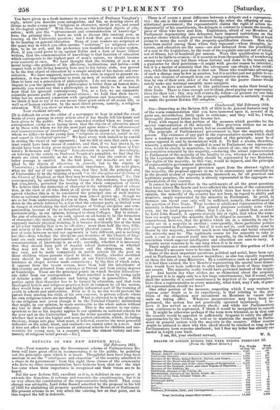DEFECTS OF THE NEW REFORM BILL.
22d February 1854.
SIR—Your remarks upon the Government scheme of Parliamentary Re- form will have great effect in recommending it to the public, by pointing out the principles upon which it is based. Thoughtful men have long been anxious to see the "intelligence and education" of the country admitted to a share in its government : from this right those classes of the community who have no other recommendation have hitherto been shut out : the time has come when their importance is recognized and their voices ate to be heard.
But the new Reform Bill, excellent as it is, is deficient in one respect: it extends the franchise, it reforms and remodels the constituencies, but it in no way alters the constitution of the representative body itself. That some change was advisable, Lord John Russell admitted by the proposal in his bill of 1862 for abolishing all property qualifications for Members of Parliament. His present scheme in no way alters the existing law on that point, and in this respect the bill is deficient. There is of course a great difference between a delegate and a representa- tive : the one is the creature of democracy, the other the offspring of con- stitutional government; the representative claims the right of action in- dependently of his constituents, the delegate is content to remain the mouth- piece of those who have sent him. Englishmen, afraid of our Members of Parliament degenerating into delegates, have imposed restrictions on the popular choice which often prevent their being representatives. This at least seems to many the result of the property-qualification clauses. Men who have been reared among those whom they represent—whose thoughts, in- terests, and education are the same—are now debarred from the possibility of a seat in the Legislature, by the want of the requisite amount not of talent, not of fitness, but of hundreds per annum. Were this qualification so high as not to be liable to evasion—if it secured us from the possibility of numbering among our rulers any but those whose fortune and stake in the country are a guarantee for their patriotism—it might with greater reason be defended; but it is a matter of notoriety that the adventurer can obtain a false certifi- cate, while the honest poor man is shut out. Those who would take advantage of such a ohange may be few in number, but it isneitherjust nor politic to ex- clude any element of strength from our representative system. The exposi- tion by one of their own order of the feelings of the poorer classes would surely make any national assembly more complete.
As yet, we have not learned to like politicians who make their bread by their trade. There is time enough yet to think about paying our representa- tives for their toil ; this step will eventually follow—at present we can bide our time : but the abolition of the property-qualification is certainly wanted
to make the present Reform Bill complete. M. J.
































 Previous page
Previous page